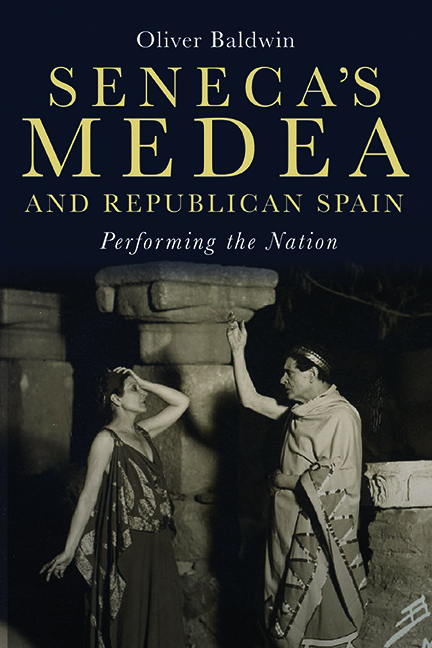Book contents
- Frontmatter
- Dedication
- Contents
- List of illustrations
- Acknowledgements
- List of abbreviations
- Introduction: A Spanish Medea in Republican Spain
- I Seneca’s Medea in Mérida: A reconstruction
- II Seneca and Hispania
- III Republica nunc sum: Building a Republic
- IV Medea and the social revolution
- V Hispano-Roman tragedy on a reformed stage
- Conclusion: The Republican Medea that was in Mérida
- Bibliography
- Index
III - Republica nunc sum: Building a Republic
Published online by Cambridge University Press: 07 October 2022
- Frontmatter
- Dedication
- Contents
- List of illustrations
- Acknowledgements
- List of abbreviations
- Introduction: A Spanish Medea in Republican Spain
- I Seneca’s Medea in Mérida: A reconstruction
- II Seneca and Hispania
- III Republica nunc sum: Building a Republic
- IV Medea and the social revolution
- V Hispano-Roman tragedy on a reformed stage
- Conclusion: The Republican Medea that was in Mérida
- Bibliography
- Index
Summary
A single cry has crowned the performance: Long live the Spanish Republic! (La Voz)
The republican sentiment at the premiere of Seneca's Medea on 18 June 1933 in Mérida, attended by the Prime Minister of the Republic, Manuel Azaña himself, was so acute that an anonymous cry cut through the performance: ‘Long live republican art!’. Two ministers accompanied the Prime Minister in Mérida, as well as a great number of MPs from the main republican parties and many national and regional authorities. The republican national anthem was played as the governmental committee entered the Roman Theatre. The President of the Republic himself, Niceto Alcalá Zamora, watched, in September 1933, the performance of Seneca's Medea at the Royal Palace of the recently dethroned Bourbon Monarchy, accompanied by three more ministers. It is thus clear that, in addition to the public funding of 50,000 pesetas it received, the Second Spanish Republic, as a state, government and new national culture, Hispanitas, positioned all its weight and influence firmly behind its active sponsorship of the production of Seneca's Medea in 1933.
Given all its republican echoes and national ceremonial grandeur, how did Seneca's Medea fit and develop the republican regime change, specifically the cultural agenda and policy of the Republic's constituent period (April 1931–November 1933)? To answer this, we shall first explore how the new regime was ideologically shaped by the intended role of culture in the implementation of educational reform and the reinforcement, restructuring and dissemination of culture, with a special emphasis on theatre. Secondly, we shall examine how Seneca's Medea is central to the Republic's pursuit of a Spanish National Theatre, national unity, and ethical improvement through aesthetic means. Finally, we shall look at how the association of Seneca's Medea with the Second Spanish Republic was contested by voices contrary to the new regime, thus revealing its intertwined nature. Seneca's Medea will thus appear as playing a most relevant role within the agenda of regime consolidation, educational dissemination, promotion of culture, and theatrical renovation, as pursued by the first government of the Second Spanish Republic.
A Republic of citizens: Culture and education
The Republic's counter-hegemonic vision came to guide Spain's future away from its traditionalist, Catholic, monarchical, and authoritarian path and into democracy, secularism, civil rights, culture, and modernity, from Hispanidad to Hispanitas, as seen.
- Type
- Chapter
- Information
- Seneca's Medea and Republican SpainPerforming the Nation, pp. 115 - 170Publisher: Boydell & BrewerPrint publication year: 2022



